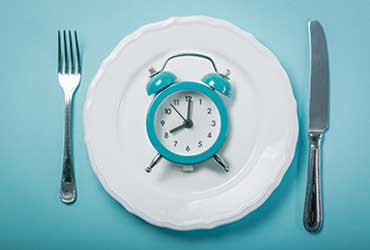June 21 --the official beginning of summer --is almost here. Tis the season when many change their diet and exercise more in the sunny outdoors. This warmer weather is a natural appetite suppressant. And that's good news to anyone who is observing Ramadan this month and those who practice intermittent fasting. But how does the heat affect the human appetite? And what should you keep in mind if you’re fasting?
The heat is on
Many say the human body is the perfect machine, and there’s no question that it's certainly very intelligent and perceptive. Our brains, through the function of the hypothalamus, help us prioritize biological processes to suit the actual conditions and act on it. In warm and hot weather, the heat takes away the body’s moisture as the brain regulates the internal temperature by sweating. So as your body sweats, the hypothalamus is preoccupied with staying cool, which means less brain power is spent on hunger. Eating and digestion are counterproductive to this cooling (these actions produce internal heat!), so the brain instinctively suppresses the appetite as a defense mechanism. Sounds like summers are great time to do a fast!
There are lots of way to fast: no sugar, no dairy, no food, just juicing. A religious fast, like for Ramadan, means completely fasting between sunrise and sunset, whereas an intermittent fast means not eating for several hours between meals. Intermittent fasting, is a diet trend which may help with weight loss by giving your body more time to process food either mornings or nights. Food is allowed during short 4/6/8-hour windows and the rest of the day is spent skipping meals and staying hydrated with caffeine-free beverages, fasting.
Before beginning any type of fast, it's important to prepare your body. 1). Reducing food intake (smaller meals, less fatty foods) to get your stomach (and brain) used to less food. 2). Drinking more and more frequently water (or herbal tea) in the days leading up to a fast. Smaller portion size and hydration are great way to get started. When your body is well-hydrated, it's easier to manage your day without your usual amount of food and drink. So, yes, 8 glasses (about 1 liter) of water a day is a good rule of thumb. 3) Cutting out white flour and sweets (1-2 weeks in advance) so your body doesn’t react with cravings and hunger pangs. 4) Reducing physical activity. Light activity is ok, but strenuous exercise will only prompt your body to look for energy—in the form of food. 5) Waking up a bit earlier and mentally preparing for the day’s fast – mind over matter! Meditation may help to settle your mind and body. 6) Taking power naps (30 minutes or less!) before and during the fasting period. 7) Writing down a fasting schedule. If you know what to expect each day, the challenges to break your fast may be easier to manage.
Not matter what your inspiration to fast might be – religious, mental, or nutritional – the key to a successful and rewarding fasting period is planning and determination. Before changing your diet or fasting, you should always consult your doctor or health care professional. Your health comes first!

